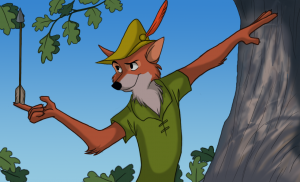In “Robin Hood: Why Ayn Rand Got It Wrong,” Charles Burris writes that “[i]n one of the most memorable passages of her novel Atlas Shrugged [Rand] has one of her major characters, Ragnar Danneskjold [sic], condemn Robin Hood in the harshest and most vindictive manner.” But “Rand got it wrong,” says Burris, since in most versions of the legend “Robin and his band are not the proto-Marxist proletarian plunderers of the productive rich and despoilers of private property but are actually defenders of justice in property titles, the rule of law, and the non-aggression principle.”
I suspect that Burris read Ragnar’s speech a bit too hastily, since a careful reading shows that Rand is well aware of the information that Burris thinks she missed. Rand has Ragnar explicitly acknowledge that in the original legend, Robin Hood “fought against the looting rulers and returned the loot to those who had been robbed.” Rand didn’t need Burris to tell her something so obvious. But, says Ragnar, this is nevertheless “not the meaning of the legend which has survived,” since the fact that Robin Hood is always described as a man who “robbed the rich and gave to the poor” shows that, whatever the details, the essence of the Robin Hood legend is his status as “the symbol of the idea that need, not achievement, is the source of rights.”
Now I do think Rand is making a mistake here; but the mistake is not a simple one of ignorance about the Robin Hood legend. Rather, Rand’s mistake is one of assuming that most rich people in modern “capitalist” society are rich mainly through production rather than privilege, and so of assuming that resentment against the rich, in a modern context, is ipso facto resentment against productivity.

No comments yet.